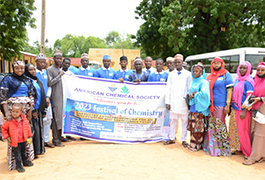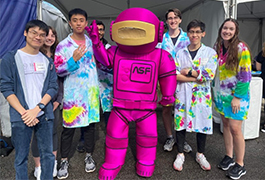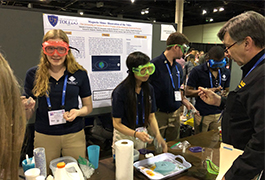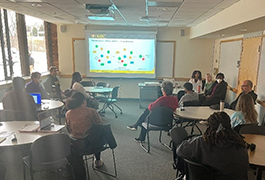Spotlight: Saint Joseph's University
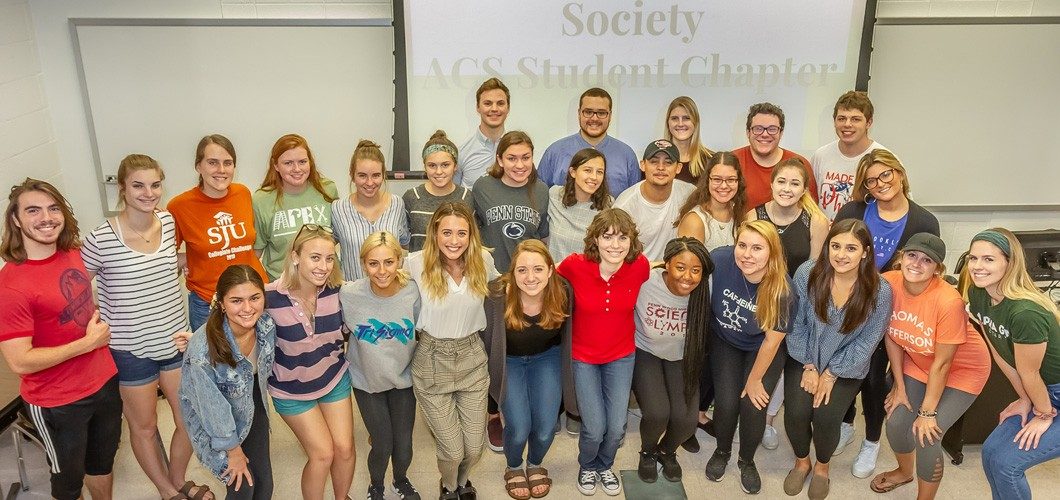
Location: Philadelphia, PA
Faculty advisor/Co-advisor: J. Scott Niezgoda
Presidents: Isabella Armento and Elise Brutschea
Chapter Members: 53
Facebook page

How did you celebrate National Chemistry Week?
In celebration of the theme "Chemistry is Out of This World," we learned about Stephen Hawking's solar sail, which has the prospect of traveling to the star Alpha Centauri. Our members also made space-themed baked goods and sold them in the library during National Chemistry Week to raise funds for the chapter.
In what ways does your chapter contribute to the community?
A large part of our club is giving back to the community and teaching a love of science to others. In the fall, we participate in the Harvest Festival at the Wagner Free Institute of Science in Philadelphia, which is a Community Science Day that focuses on the science of autumn. Last semester, we had a Halloween science experiment that investigated the densities of different candies. Volunteers interacted with 40 young kids and their parents to teach them about science.
Also in the fall, we have a tradition of inviting high school students from a local Philadelphia public school to our campus for a solar cells experiment. These enhanced college visits are intended
to get high school students excited about the prospect of college and about science. We divide the students into teams, and each team builds a blackberry solar cell; the winning team is determined by whose cell is the most efficient.
In the spring, we will be participating in the Philadelphia Science Carnival.
What is your most successful recruiting event or recruiting method?
Most of our members are chemistry, chemical biology, or biology majors. These three majors are relatively small, so everyone generally knows about our club. We send e-mails to the incoming students in these majors about our first club meeting (usually featuring free food and a fun activity). Students often join from word-of-mouth promotions… and they hear that our club is really fun.
Another way we recruit members, especially outside of the science majors, is at the fall semester Activities Fair, which promotes campus clubs and teams. We give away a 1000 mL graduated cylinder filled with fruit taffy candies to the person who comes closest to guessing the number of candies in the cylinder. The event gets us a long list of e-mails for prospective members!
What methods do you use to retain members from year to year?
Our philosophy to retain members is to provide a really fun and helpful year, every year. We host a variety of events—social, academic, volunteering—so there is always something for everyone. Not every student wants to get the same thing out of the club, so by having a variety of events throughout the year, we retain members.
What are your most popular or unique chapter activities?
Our most popular chapter activity is our club meetings. Every month has a theme, such as space chemistry, liquid nitrogen, holiday science, or food science. We try to have a social activity (like trivia) or an interactive experiment (like using a banana as a hammer or making stress balls with non-Newtonian fluids). Most of our active members attend every meeting, because they are so much fun!
What types of activities do you sponsor?
We sponsor social, academic, and volunteering events. Our social events include football parties, end-of-semester parties with faculty, and visits to science museums in Philadelphia. Our academic events include LinkedIn workshops, seminars, luncheons with seminar speakers, and graduate school application workshops. Our volunteering events include various Philadelphia science community days and inviting high school students to campus for blackberry solar cell labs.
What innovative communication methods are used to inform chapter members of chapter activities?
Our communication methods include Facebook and LinkedIn. Our Facebook page is more of a social page where we update our friends, alumni, and family members about various events. A LinkedIn group, however, allows us to communicate in a professional way with our alumni. We use it for networking, discussing careers and graduate school, and connecting current students with previous chapter members.
What is your most successful fundraiser to date?
Our most successful fundraiser is our Valentine’s Day Test Tube Sale. We fill test tubes with pink, red, and white chocolate candies and sell them in the library over the course of a week for $1 each. These Chemistry Valentines are popular among all students, not just science students, and the fundraiser is always very successful. We end up making about $300–400 each year.
If your chapter has recently attended an ACS meeting, how did members benefit?
One of our chapter’s main goals is to provide funding for our members to attend the ACS national meeting once a year. A lot of our members conduct research, and the opportunity to present their research at a national meeting is integral to their future at competitive graduate schools. Presenting research also allows for communicating with the scientific community, teaching others about what we have learned in lab, and getting new ideas for our research projects. We also have a poster for our student chapter. This poster allows us to promote with other ACS student chapters to hear about their ideas and events and to communicate our chapter happenings to them. Attending the national meeting allows our members to attend scientific talks and learn more about the current chemistry research. Members get to attend talks by prospective graduate school principal investigators, to learn more about their research.
Describe a recent challenge and how your chapter overcame it.
Two recent challenges our chapter faced were with continuity from year to year and with member involvement. In the past, the executive board has had to reinvent the wheel for the chapter, because the executive board was four members who are usually seniors. Our challenge with member involvement was a result of having mostly juniors and seniors participating in the club; younger students would not participate.
This year, we restructured our executive board. We created four chair positions (external relations, science outreach, fundraising, and public relations) in addition to the four current officer positions (a president and a vice president or two co-presidents, a treasurer, and a secretary). The current officers are elected every year in the spring for the following academic year, so the new officers have the summer to prepare for the fall. The new chair positions will be elected in the fall for the academic year, to allow and encourage first- and second-year students to run. We intend for these chair positions to move up into the other executive positions, especially president, to stimulate continuity from year to year. It will also increase the involvement of younger students.
Faculty Profile
J. Scott Niezgoda
How many years have you been a faculty advisor?
This is my first year.
Why did you become a faculty advisor?
Since I am a new faculty member, it is important for me to be very involved in the department. This was a great opportunity for me to get to know the students and the department better. Also, as someone with a strong background in science outreach, I hope to bring this to the forefront of the chapter.
What challenges have you faced in your position?
I want to be able to make this a student group that is enjoyable for students to participate in and keep this positive culture consistent from year to year.
What has been the most rewarding aspect of your service as a faculty advisor?
I hope that the new lounge, the events, and the activities at meetings will bring different years of chemical biology and chemistry majors closer to one another. Also, it would be rewarding to see students active in outreach to underserved high school students; this is very important to me, and I hope to grow this new aspect of the club.
Want your student chapter to be featured?
Let us know you want the spotlight at inchemistry@acs.org.

